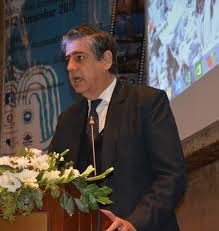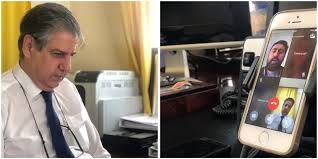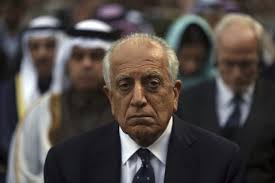Historic opportunity for peace in Afghanistan: Ambassador Stefano Pontecorvo

It has been 71 years since the North Atlantic Treaty Organization (NATO), also called the North Atlantic Alliance, was founded. It entered to Afghanistan almost nineteen years ago, back in 2001. It has been engaged militarily in Afghanistan to fight against terrorism and never to let the country become again a safe haven for terrorism. Although it contributed to reconstruction, development and support of the Afghan forces in Afghanistan and has had many achievements, still a war is going on in the country. The NATO’s 19 years of war that claimed the lives of thousands is expected to be ended through negotiations. For further discussions, we have Mr. Stefano Pontecorvo, the Senior Civilian Representative of NATO in Afghanistan.
The Killid Group Conducts an Interview with Ambassador Stefano Pontecorvo, NATO’s Senior Civilian Representative in Afghanistan.
The Killid Group: Hello Ambassador. Thank you so much for speaking with us today. We would like to first know that how do you assess the ongoing Afghan peace process?
Mr. Pontecorvo: This is a historical opportunity for peace in Afghanistan. Everyone must seize this opportunity because the Afghan people will not forgive, nor forget those who stand on the way of peace. Peace processes are not easy and they require compromise by the warring parties. Both parties to the conflict must continue to build confidence; finalize prisoner release and start intra-Afghan negotiations, showing real commitment to peace and the peace process.

The Killid Group: Yes, absolutely! Now, to what extent are you confident that peace efforts will succeed?
Mr. Pontecorvo: All Afghans demand peace. There has been too much suffering, and yesterday was late for the conflict to end. There is no military solution to this conflict. It can only be solved through political negotiated settlement. Intra-Afghan negotiations must start as soon as possible. They must be truly inclusive to achieve durable peace. And I welcome the efforts by the government so far on creating an inclusive negotiating team and on the progress it has made on the prisoners release. The government and Afghan leaders must continue building a united front. And durable peace must be built on achievements of the past 19 years, including human rights, women rights and rest of minorities, civil freedom and liberties, press freedom and the life.
The Killid Group: We would like you to elaborate on what roles NATO has played in the Afghan peace process, so far?
Mr. Pontecorvo: NATO has supported the efforts of Ambassador Khalilzad to bring the parties together to set stage for an Afghan-owned and Afghan led process. As part of the Doha agreement between the Taliban and the U.S., we have agreed to drawdown our forces in support of the peace process. We have now, in fact, come down from 16,000 troops. But no decision has been made on further reduction. Our presence in Afghanistan is conditions-based, and we will make adjustments depending on the progress on the peace negotiations. The Taliban must live up to their commitments, cut ties with terrorist groups and enter the intra-Afghan negotiations at good faith as soon as possible. We have also supported the ANDSF through our Resolute Support Mission to train, advice and assist the Afghan security forces who had become increasingly professional. It was ultimately them with our assistance who have made the Taliban realize that they cannot win on the battlefield, and they have to sit at the negotiating table. We are proud of their achievements, including their professional commandos, air force and a quality leadership and interoperability. As NATO, we will continue our support to the ANDSF with training and funds and they provide security for Afghans and set the conditions for peace.

The Killid Group: Mr, Ambassador! To what extent are the disputes of the warring parties over the release of prisoners and the start of the long-awaited peace negotiations frustrating?
Mr. Pontecorvo: Prisoner release is one of the sticking points currently that is no news. It is not an easy process logistically and legally, and I understand different concerns. But this issue needs to be finalized as soon as possible and I urge flexibility on both sides. We are not seeing much of on the Taliban side whereas I believe the government is doing all of them. This will bring us closer to the intra-Afghan negotiations which is the best chance for peace in Afghanistan.
The Killid Group: Based on your perspective, what are the main obstacles on the way to ending the longest-running war in Afghanistan?
Mr. Pontecorvo: Violence perpetrated by the Taliban remains the main predicament to peace. The current level of violence is totally unacceptable and aren’t compatible to creating the conditions of trust. They are not conducive to establishing a favorable environment for the intra-Afghan negotiations. The Taliban must sure they are honest about peace and live up to their commitments. The North Atlantic Council, NATO’s highest decision-making has issued a statement last week, calling on the Taliban to cease violence, finalize the prisoner release and to move to intra-Afghan negotiations in good faith. Afghan have suffered enough and the Taliban must play their part to end that suffering of their fellow citizens.
The Killid Group: Afghanistan’s politicians believe NATO is influenced by the United States in making its decisions about the war-racked country, do you agree with this? If yes, why?
Mr. Pontecorvo: No, I don’t agree with that. We are united in our approach towards Afghanistan. The US is a NATO ally and a member to the 38 nations resolute support mission we have in Afghanistan. We came to Afghanistan together. We keep adjusting our clustering close coordination. And when the time is right, we will leave together. Last month, NATO defense ministers reaffirmed the strong commitment of the Afghanistan’s long-term security, stressing on this commitment is vital for the peace process moving forward.





